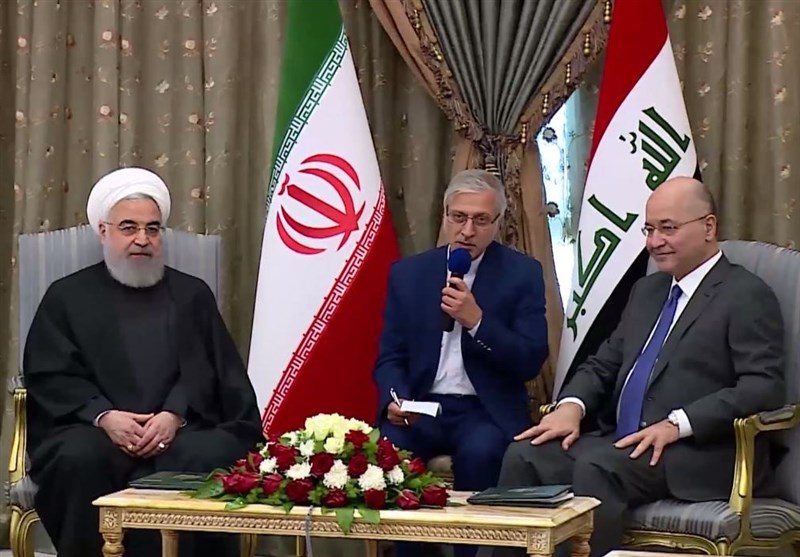Despite a history of bitter rivalry between Iran and Iraq, authorities have come together this week to agree to no-fee visas, the construction of a border railway connecting the two Middle East neighbors, establishing joint industrial parks, and cooperating on oil and gas projects.
“The two sides agreed that tourism, pilgrimage and commerce visas will be free of charge for the citizens of both countries starting from April 1,” read a joint statement published on March 11 and following two days of intensive negotiations between Iraqi authorities and a high-level Iranian delegation headed by President Hassan Rouhani.
"The two sides also discussed a number of regional issues, common challenges, fighting terrorism, cooperation for strengthening security and stability in the region and establishing economic cooperation that are to the benefit of regional interests and welfare of the peoples of the region," read Rouhani’s official website.
Rouhani arrived in Baghdad on March 11 for a three-day visit and met the Iraqi president, Prime Minister and members of parliament, including the speaker, as he led a political-economic delegation.
On March 11, representatives from the two sides signed five Memoranda of Understanding (MoU) in the presence of the Iranian president and Iraqi Prime Minister Abdul-Mahdi. Included were projects such as the Basra-Shalamcheh railway project, visa facilitation for investors, health- and energy-related projects, and trade. The sides also stressed the importance of creating new border crossings, establishing joint industrial parks and direct transit of goods without a need to unload on bilateral international borders.
The railroad, roughly 35 kilometers long (22 miles), will connect the Iranian border town of Shalamcheh to the Iraqi city of Basra. The route is meant to speed up trade to help reach the two countries meet their target of 20 billion dollars in bilateral trade each year. It could also significantly ease and facilitate tourism.
The Arvand River, also known as Shatt al Arab in Arabic, which was among the main factors for the Iran-Iraq war that lasted eight years in the 1980s, is one of the natural frontiers that separates the two countries. It has not been dredged during the last 43 years, but the officials have come together to start joint dredging operations to restore the main channel in which ships can sail.
The visit by Rouhani carries some significance, as the Trump administration is trying to curtail Iran’s nuclear and missile programs as well as its regional influence through the reimposition of harsh sanctions. He used the visit to lash out against the West and the United States in particular.
“We did not let hegemonic powers to introduce themselves as the savior of the region, and today, everyone knows that these western powers did not have any role in the elimination of terrorists from the region.”
The Iranian president went on to say that “of course, terrorism has not finished yet, and it is possible that they make different problems for the peoples of the region, because the Americans are transferring them to Afghanistan, Central Asia and Caucasus.”
Bilateral trade between Iran and Iraq stand at $12 billion per year. Officials are hoping to get that figure up to $20 billion per year, despite U.S. sanctions.
Besides pressure on Tehran, the United States has been put pressure on Iraq over its imports of Iranian natural gas and electricity. In December, the Trump administration issued a second waiver that allowed Iraq to continue paying for such imports for another 90 days.
“Iraq’s current production of gas is not enough to meet our power stations’ demand and therefore we are still importing gas from Iran. We need at least 24 months to operate new gas projects and start production,” Hayan Abdul Ghani, the head of the state-run South Gas Co. said according to Reuters.
In February, Iran and Iraq signed a one-year renewal of their electricity contract, despite pressure from the U.S. for Baghdad to end Iraq’s energy dependency on Iran. Under the deal, Iran exports 1,200 megawatts of electricity to its neighbor.







 President Ilham Aliyev shed light on the evolving contours of the peace process with Armenia during an international conference in Baku this week. ...
President Ilham Aliyev shed light on the evolving contours of the peace process with Armenia during an international conference in Baku this week. ...
 Azerbaijan and Armenia started the process of demarcation of their border on Tuesday, with the installation of the first border markers based on ge...
Azerbaijan and Armenia started the process of demarcation of their border on Tuesday, with the installation of the first border markers based on ge...
 Armenian sappers commenced on Monday mine-clearance operations in the territories adjacent to the Saint Mary Church in village of Voskepar (Armenia...
Armenian sappers commenced on Monday mine-clearance operations in the territories adjacent to the Saint Mary Church in village of Voskepar (Armenia...
 As the conflict between Ukraine and Russia escalates, the strategic importance of Kharkiv, Ukraine's second-largest city, has come sharply into focus.
As the conflict between Ukraine and Russia escalates, the strategic importance of Kharkiv, Ukraine's second-largest city, has come sharply into focus.



